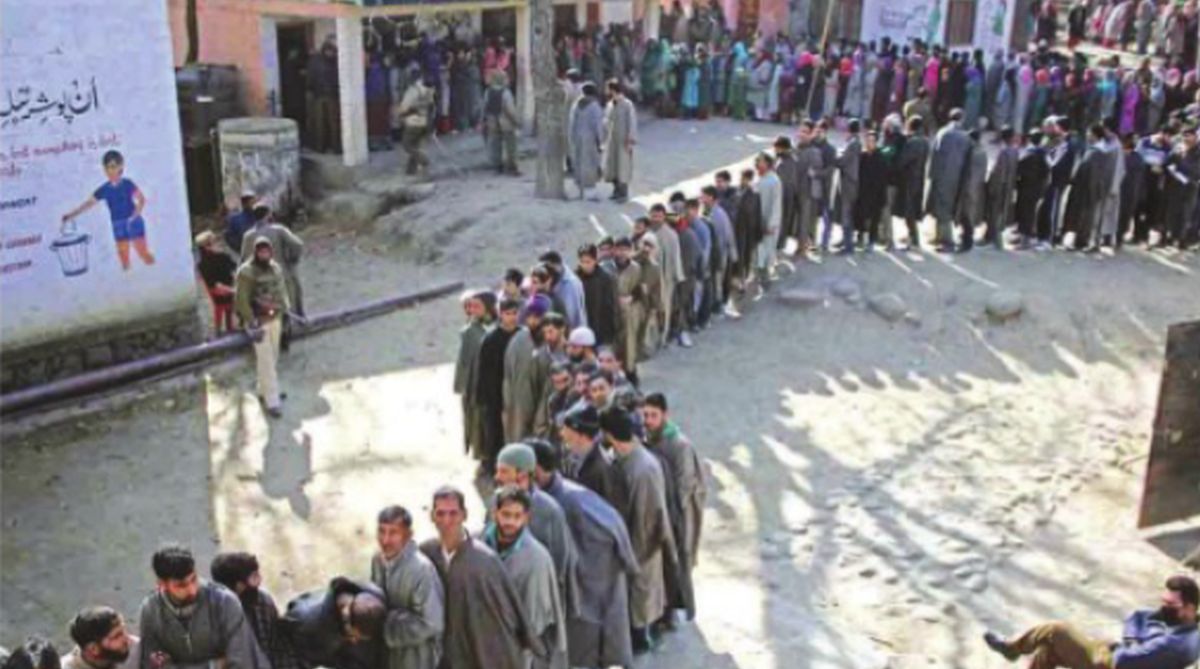Jammu and Kashmir: Migrant labourer from Bihar shot dead by terrorists in Anantnag
The victim, whom the police identified as Raju Sah of Bihar, succumbed to injuries during treatment.
The boycott call by Pakistan-backed separatists has dampened the mood ahead of civic elections in the state.

File photo elections in J&K.
Amid the poll boycott call by Pakistan-backed terrorists and separatists, enthusiasm is lacking in the Kashmir valley for the elections to civic bodies after a gap of several years. Polling for the 79 municipal bodies of the state will be held on 8, 10, 13 and 16 October.
The valley is in the grip of fear as candidates who gathered courage to file their nomination papers are being threatened and coerced to withdraw. Several candidates have been huddled in various police stations to save their lives.
Interestingly, names of candidates contesting these elections across Kashmir are being kept secret by the authorities and there is no election campaign because of fear of terrorists. This is the first time that the electorate would see the list of candidates of their respective areas only when they go to the polling booths to cast their votes.
Advertisement
Leaking of the names of about 30 candidates in the nerve centre of terrorism in South Kashmir has made at least a dozen candidates withdraw from the polls.
Top separatists Syed Alishah Geelani, Mirwaiz Umar Farooq and Yasin Malik have called for a complete shutdown on the polling days. As a fallout of the poll boycott call, in as many as 244 out of the 624 seats in Kashmir candidates have won the election unopposed as there was no one to contest the election against them. Not a single nomination has been filed for 177 seats.
However, Jammu division is witnessing a hectic election campaign and the poll boycott call has been rejected there even in Muslim majority areas.
The poll scenario has come as a boon for the BJP that is for the first time heading towards capturing at least seven municipal bodies in terrorism- ridden South Kashmir where some Kashmiri Pandit migrants, while sitting in Jammu, have also filed their election papers. The party has so far won about 69 seats without any contest. The BJP fielding Farooq Khan, a former right-hand man of Pakistan-based global terrorist Syed Salahuddin, in a ward of the Srinagar Municipal Corporation has given an opportunity to other parties to call the party “double faced” on the issue of terrorism.
Farooq Khan had crossed over to Pakistan in 1989 and received arms training in a camp there.
The National Conference (NC) Kashmir provincial president Imran Nabi Dar said the BJP has exposed its “double face” by fielding former terrorists on its party symbol. Dar expressed surprise with the way BJP is giving tickets to ex-militants when the party had opposed the rehabilitation process of militants initiated by Omar Abdullah- led government in 2011. He alleged that the BJP was trying to polarise the situation by fielding such migrants who were unfamiliar with the area from where they were being made to contest the election.
Poll boycott by the NC and People’s Democratic Party (PDP) and the Congress not fielding its candidates on several seats in Kashmir, has turned into a windfall for the BJP that is the biggest gainer despite lack of its cadres in the valley. The party had failed to win a single seat in Kashmir during the last Assembly elections.
The municipal elections will be followed by the Panchayat polls that will be held in 9-phases for the 4490 grassroots bodies. Polling will be held between 17 November and 11 December.
Successive governments in the state have not extended the 73rd Amendment to Jammu and Kashmir as a result of which the Panchayats have remained a toothless institution. The 73rd Amendment became applicable in the rest of the country more than 26 years ago.
However, without creating another controversy by touching the 73rd Amendment, the Governor Satyapal Malik last week empowered the panchayats by giving them control of about 20 departments in their respective areas by amending the Panchayati Raj Act, 1989.
The amendments define the role of the Gram Sabha in detail, placing the power to plan, implement, monitor and supervise various government schemes and programmes in the hands of people themselves. Implementation of important schemes like MGNREGA, Pradhan Mantri Aawas Yojana, Mid-Day Meal and ICDS has been devolved to the Panchayats.
The monitoring and supervision of schools and health institutions has also been passed on to the PRIs to make them accountable to the society.
The Panchayats shall also be conducting quarterly social audit of works and programmes in their area. However, along with all the authority, responsibility to ensure the socio-economic and human development of the area including literacy, sex ratio, water conservation, natural resource management, agriculture, horticulture development, health, etc., has also been placed on the shoulders of the panchayat. They have also been made the agents of change through sensitisation and awareness generation.
Advertisement